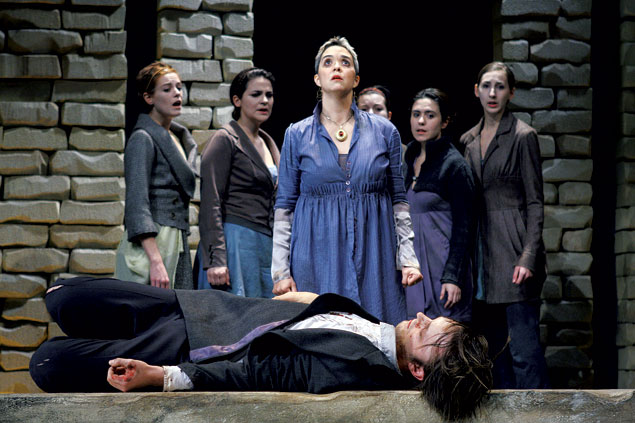If you were to map out the Washington theater scene,
six-degrees-of-separation style, there’s a chance Aaron Posner might be in
the center. Posner has been a fixture at the Folger Theatre for more than
a decade; has directed shows at Studio, Woolly Mammoth, and Theater
Alliance; and has had his own plays performed at Arena and Round House.
This season, he’s directing The Conference of the Birds
at the Folger, making his Signature debut with Crimes of the
Heart, and seeing a show he authored—a take on Chekhov’s The
Seagull titled Stupid F—ing Bird—premiere at Woolly
Mammoth, with Howard Shalwitz directing.
At the Folger, where Posner has directed a show for 14 seasons
running, artistic producer Janet Griffin describes his style as “up all
night” and his methods as meticulous: “He’s inspired but very thorough in
thinking things through.”
His mark on Washington theater is thanks in part to actress and
friend Holly Twyford, whom he came to see in Romeo and Juliet at
the Folger in 1997. Afterward, he got to chatting with Griffin, which led
to his first directing gig at the theater, 2001’s acclaimed As You
Like It, followed by a string of Shakespeare plays—Othello,
Twelfth Night, Macbeth, Measure for Measure, The Comedy of Errors, The
Taming of the Shrew, and more—as well as a production of Cyrano
that Posner co-adapted and a version of The Winter’s Tale by
Craig Wright called Melissa Arctic.
In 2010, after two decades at Philadelphia’s Arden Theatre
Company and four years at New Jersey’s Two River Theatre Company, Posner
moved to Washington with his wife, actress Erin Weaver—they live in
Riverdale with their year-old daughter. “I had a desire to be someplace
where I could have a family and not be traveling all the time,” says
Posner, 48. “In your twenties, you can say, ‘I hate this place and I think
North Carolina might be the next big thing,’ but you can’t do that when
you’re older.” Washington, with its wealth of theaters and thriving fringe
scene, made sense as his new base.
Posner still gets around. He opened the season by directing his
adaptation of Kurt Vonnegut stories at Oregon’s Artists Repertory Theatre,
and later he’s helming A Christmas Carol at the Milwaukee Rep,
with his wife as children’s director.
Stupid F—ing Bird arose from his fascination with
The Seagull, which features a character who’s frustrated when his
efforts to create innovative theater are laughed at. Posner crafted
several scenes of an “irreverent riff” and sent them to Woolly artistic
director Howard Shalwitz, who booked the show for next spring.
Posner, who cheerfully peppers conversations with
profanities—as seen in his newest show, whose official title spells out
the F-word—says: “I can’t direct Shakespeare without
swearing.”
He discovered acting as a high-schooler in Oregon. At
Northwestern, where Posner performed with Mary Zimmerman—now a director
and MacArthur Foundation “genius grant” winner—Posner found a program that
combined literature and performance, an experience he likens to feeling as
if he’d gone to heaven. Nearly three decades later, one of the things
Stupid F—ing Bird deals with is his dissatisfaction with the
state of theater: “It doesn’t do as much as it needs to. It’s too pale and
small in its ambitions.”
The Conference of the Birds, which Posner directs this
month at the Folger (see Where & When, page 29), is part of his
remedy. The adaptation, by Jean-Claude Carrière and Peter Brook, of an
Eastern parable was first staged by Brook in the ’70s. Says Posner: “It
asks questions about who we are as humans, our essential nature, our hopes
and fears for the world.”
While he’s happy to be entertained, he believes drama can do
more. He aims to make it do so while challenging himself: “No matter how
old I get, I don’t want to get old in my ideas.”
This article appears in the October 2012 issue of The Washingtonian.



















